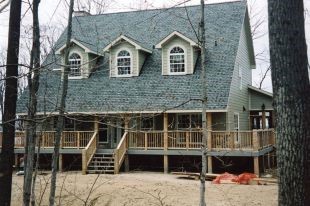
The Ottawa Business Journal tells MHProNews that Guildcrest has found creative solutions to problems such as how to keep load heights to about 13 feet. They accomplish this by making sure that gang nail roof trusses are hinged so they unfold upwards after delivery and lock in place.
Guildcrest Manager George Tierney, notes: “We’re pretty sure that if a wood-frame building comes into contact with a concrete overpass at 100 km/h, well, we know who’d win.”
The company has overcome technical challenges like this through innovation. It also appears to be able to consistently deliver good-quality products on time, an issue that often bedevils the stick-built mainstream homebuilding business.
Indeed, a lot can go wrong when building a new home. It’s a complicated process, and it’s not unusual to have 30 or more unresolved building issues when a new stick-frame house is completed.
However, assembling houses in a controlled environment, as Guildcrest does, means that they can deliver on time and with fewer problems. The firm’s record with Tarion, Ontario’s new home warranty program, seems to bear this out.
In 10 years, Guildcrest has sold 418 dwellings in Ontario. During that time, it has had just one chargeable conciliation, which occurs when Tarion determines that one or more items reported by the homeowner are warranted under the plan and the builder failed to repair or resolve the items during the applicable repair period.
Guildcrest has an interesting history. The company began as Dutch Sash and Door. Then it was sold to a Toronto-based company that drove it into bankruptcy within 18 months, whereupon it was purchased by Bob Egan, David Poupor, John Coppens and two others who transitioned it to the Guildcrest brand and name. It’s also been known as Morewood Homes in the past.
Today, Guildcrest is owned by Saint-Apollinaire, Quebec-based modular home manufacturer Pro Fab, which in turn is owned by an enormous private equity firm, Wynnchurch Capital of Chicago.
Wynnchurch has been buying up modular homebuilders across North America with a view to driving down costs and increasing market share. If it succeeds, it could revolutionize an industry that clearly needs updating.
So what’s standing in its way? First, the conservative nature of the industry itself, which suffers from an unwillingness to embrace change in what is a very inefficient system.
Second, what works in Quebec, Michigan, New York or New England doesn’t necessarily work in Ontario and vice versa. A one-size-fits-all-approach to design and construction isn’t always the right way to go.
Third, a significant portion of the traditional new home marketplace mistakenly thinks of modular homes as unimaginative and inflexible in terms of design. Nevertheless, Guildcrest Sales Chief Roy Mills dismisses such worries, saying those issues are a thing of the past.
“That stigma is gone,” he says. “We build big homes, small ones, townhomes, side-by-sides, duplexes, triplexes. We fire rate them vertically and stack them side by side. We do in-fill housing now. Plus, from start to finish, we deliver in just four months.”
The firm has three sales channels: retail (sales to consumers who have their own lots), authorized builders (a wholesale channel) and developers (who are bringing an entire subdivision online).
In addition, Guildcrest is able to do more than just sell a consumer a modular home. It will take charge of the entire project from excavation, footing, and foundation to the occupancy permit.
It is also a major exporter to the United States. When the Canadian dollar sank to 63 cents, Mills recalls fondly, “We made a killing, especially in upstate New York, where Guildcrest is a licensed builder.”
Guildcrest also supports the land-lease recreational market in a big way. Its largest customer is Parkbridge Lifestyle Communities, Canada’s premier owner and operator of residential land lease communities and resorts. Currently, this company owns about 300 retirement communities, cottage communities and RV resorts. ##
(Photo Credit: Guildcrest Homes)

Article Submitted by Sandra Lane to – Daily Business News- MHProNews.

























